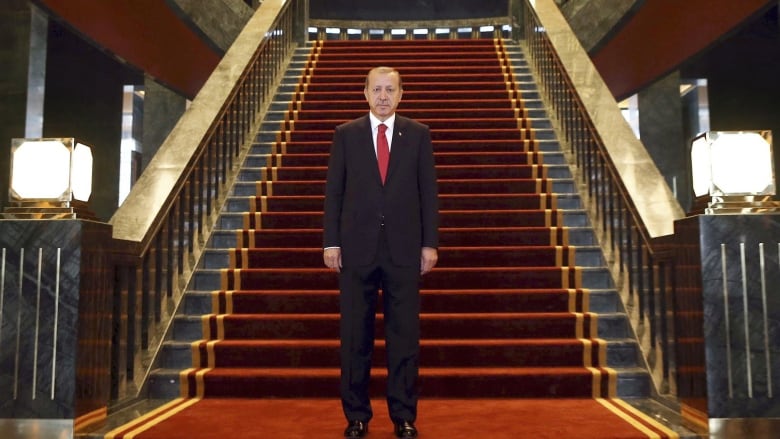Airport attack another reason for Turkey to ditch its 'precious loneliness': Brian Stewart
Ankara seems convinced it needs a strategic rethink that involves rebuilding friendships

The attack on the Istanbul airport is but the latest trauma in a nightmare couple of years for Turkey. It has been battered by terrorism, overflows of refugees, political turmoil, and even a headlong descent into friendless international isolation.
The latest bloodshed is expected to persuade Ankara to engage in the fight against ISIS far more forcefully, and lessen its often standoffish attitude toward other nations.
The West has had chilly relations with what many consider the iron-fisted and thin-skinned government of President Recep Erdogan. The U.S. has been exasperated at times with Turkey's sluggish role in combating ISIS, including its only belated attempts to block the movement of ISIS fighters who cross its highly porous borders into Syria and Iraq.
- Bombings quiet vibrant Istanbul, leaving streets empty
- What we know about the victims
- Turkey's Erdogan: Doing it his way, at home and abroad
The European Union also frequently complains of human rights abuses in Turkey and has made it embarrassingly clear that the EU membership Turkey was expecting now faces extraordinarily difficult hurdles.

Turkey's role in Middle East politics, often seen as both aloof and overbearing, has had mixed results and alienated many of its neighbours, including Iraq, Iran, Syria, Saudi Arabia and Egypt.
But Turkey certainly doesn't deserve all the blame. Relations in the region are notoriously unstable and the conflicts engulfing both Syria and Iraq inevitably lead to competition and friction between the outside parties involved. Turkey's campaign to try to depose Bashar al-Assad in Syria has produced enemies over the years.
'Precious loneliness'
Its economic success in recent years has also created suspicion in the Islamic world that it harbours ambitions of reviving the Ottoman Empire it ruled until its collapse in the First World War.
Still, there's an attitude. Turkey's loss of international friends and cooling relations with allies has been greeted with a perverse sense of stand-alone pride. An Erdogan adviser even boasted about this aloofness, calling it "precious loneliness."
Turkey has been particularly slow to accommodate the security priorities of others in the separate fights against Assad's regime in Syria and against ISIS. At the core, Turkey saw the toppling of the Assad regime as the essential first goal, with ISIS only a secondary target to be left for later, while the U.S. and Western view is that ISIS became the far graver danger of the two.
Turkey didn't see it that way and was also preoccupied with its security struggles against the domestic Kurdistan Workers Party (PKK), which has struggled for self-determination for Kurds.
The importance of Turkey's tourism industry is hard to overstate. It accounts for almost 10 per cent of GDP, brings in more than 30 million visitors a year and employs more than two million workers. Cripple this sector and the economy might crumble. It survives only if visitors feel safe coming, an increasingly shaky proposition.
16 terror attacks in a year
But Turkey has learned, like others before it, that ISIS grants no favours for going easy on it. The country has been hit with 16 terror attacks in a year, not all ISIS directed, but many of them are believed to be the group's work.

Officials expect a 40 per cent drop in tourists this year, a shattering blow to national revenues. Tourism has also been damaged by the standoff with Russia. President Vladimir Putin banned his people from vacationing in Turkey, a potential loss of 3.5 million visitors.
The deteriorating situation appears to have convinced Ankara it needs a major strategic rethink that involves engaging internationally and rebuilding friendships. These moves began even before Tuesday's attack, when Erdogan finally wrote the full apology to Putin for the downed plane. Both sides quickly vowed to make up.
Almost simultaneously, Turkey ditched a six-year diplomatic freeze with Israel that it began after Israel's raid on the Mavic Marmara relief ships in international waters in 2010. As Erdogan commented after the restoration of full diplomatic ties, Israel needs Turkey "but we have to admit we also need Israel." Astonishing words from the hyper-proud president.
Peace talks
No power is happier with the new "Turkey is Back" posture than Washington, where officials hope Erdogan will finally pull out all stops against ISIS. Immediately after the airport attack, Erdogan stressed that nations are all equal in the face of such threats: there's "no difference between Istanbul and London, Ankara and Berlin."
The anti-ISIS alliance has already noticed some improvement in Turkish security efforts in recent months and hopes it will do far more to seal up remaining holes in its borders with Syria and Iraq, and participate more aggressively in the air campaign against ISIS.
There are also early diplomatic hopes that Turkey will work with Moscow and Washington to restart the stalled Syrian peace talks by dropping previous objections to Kurdish involvement.
The addition of Turkey as a key player in peace efforts would be a major breakthrough. It would signal Turkey has finally concluded Assad simply can't be overthrown by war, but must be ousted in a compromise peace — and that ISIS can't be crushed without such a peace.
A Turkish policy shift could be a profound setback for ISIS.

